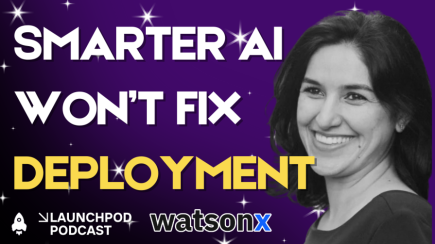It’s a pretty cool feeling when you speak at an event or get invited to be a guest on a webinar as a subject matter expert, isn’t it? But beyond the ego boost, why should you care about being a subject matter expert?

As a product manager, you need to understand your product and everything around it to be successful at your job. This spans the minutiae of how your product is designed and architected to the broader market dynamics, competitive landscape, and market needs.
So, how do you go about actually becoming a subject matter expert? In this guide, I’ll share six tips to help you build up subject matter expertise, pulled directly from my personal experience as the first product manager at three startups in three different markets.
When you first start a new job at a new company, becoming a subject matter expert in a new space might seem impossible. Believe me, I get it.
When I started my first product management role, I actually started out as a product marketer because the team was worried that I didn’t have the depth of technical knowledge needed to be effective as a product manager. This was totally fair; I had come from a finance and venture capital background and had never really gotten hands-on in building real products.
I distinctly remember joining my first team meeting and understanding perhaps 20 percent of what was said. Acronyms were being thrown around — I had no idea that GC stood for garbage collection, for instance — and I was completely and hopelessly lost. It didn’t help that I was working at a deeply technical startup, an open source database company.
Despite my horrific first day, by the end of my stint at this first company, I was able to leverage my “subject matter expertise” to transition into another open source database company startup, where I ended up delivering many conference and meetup talks.
If someone with an economics major and no prior experience in databases can get to the point of delivering talks about, well, databases, I assure you, you can build up subject matter expertise in your area of focus as well.
Although it’s generally good to ask questions, you want to be smart about when you ask questions. If you’re in a large team meeting, for example, focus more on asking specific questions targeted at the exact content being presented. If you’re in a 1:1 or smaller meeting, you can ask away, even if the questions are basic.
In lieu of asking all the questions you have right when they happen, I like to take down notes of anything I didn’t understand so that I can hide myself away, do some research, and see what I discover. Once I get some basic understanding of what’s going on, that’s when I ask coworkers for help explaining any further concepts I don’t understand.
This strategy gives you room to figure out answers and frame your questions before you ask the rest of your team. Although most teams I’ve worked with have been very generous, you also want to respect their time by doing upfront research so that when they do spend time explaining things to you, you’re ready to understand the answers they provide.
We like to think we can become subject matter experts in the industry we’re building for, but at the end of the day, the people who live and breathe the problem we’re trying to solve are our customers. They’re the ones who are using your product to accomplish something in their day-to-day jobs, so they’re well-positioned to provide a wealth of knowledge if you know how to ask the right questions.
When I started at my first product management job, I joined in on a bunch of customer calls. You learn a lot not just from hearing the founders pitch the product to customers, but also from the questions customers ask.
These questions represent challenges that customers face that they are looking for solutions for. As you brainstorm with customers, you’ll also learn important industry trends, challenges, and solutions.
If you’re not strategic, conferences can be a waste of time when it comes to becoming a subject matter expert, especially if you’re there running a booth the entire time. However, I have found conferences to be helpful when you choose a targeted conference that maps directly to the area you want to become an expert in. Some of the most useful conferences I’ve been to been either very small and focused on a single topic or run by companies who are market leaders in the space.
Talks are often too high-level to truly allow you to become a subject matter expert. Instead, seek hands-on or tactical sessions, and definitely talk to the people sitting next to you. These people are all trying to learn about the space just as you are. They might know more about certain areas than you do, and vice versa.
I would also recommend connecting with speakers who had interesting talks. These speakers are at the conference because they want to make connections, so don’t be afraid to make your way up there at the end of a talk and introduce yourself.
Sometimes, online coursework or textbooks can actually be really helpful. In particular, online resources are great for helping you understand underlying concepts so that you can start drawing your own conclusions about various topics within your space.
In my first role as a product manager at an open source database, the fundamental concepts behind distributed databases were difficult to pick up piecemeal from conferences and coworkers. What truly helped was a textbook on distributed databases, which dug into all the fundamental concepts on why distributed databases are important, what they are, and how they work.
This depth of knowledge is hard to get anywhere else. If you’re looking to dive in deep on a specific area, consider looking into these more academic resources. You might choose to just skim the most relevant chapters or read the whole thing.
It’s important to understand the competitive space as a subject matter expert. Sign up for any product announcements and newsletters your competitors publish. Personally, I also set up alerts on competitors’ websites so that I know when their positioning changes.
Keeping tabs on competitors helps you understand how the market is shaping up and also allows you to keep an eye on where the market is moving.
However, don’t just focus on the competitors of today. Often, there were companies that were founded and then failed earlier because they got the market timing wrong. These companies — why they failed and what product they shipped — can be a wealth of information. Ex-employees are often willing to spill the beans on what went wrong and what went right.
You can listen to others talk about problems for days on end, but nothing beats one hour spent feeling the pain firsthand.
Make sure to use your product often. Perhaps you aren’t the right persona for your product and thus you can’t use your product every day, but you can still run through tutorials, getting-started guides, and documentation! You can also try other products to compare the experience.
Another way to get hands-on experience is to work with customers. Ask to shadow your solutions engineering or customer success team. Take on some implementation work and join strategic meetings with the customer. This will give you insight into how customers are using your product and what problems it solves.
It’s OK if you aren’t a subject matter expert from day one. No one knows everything about a given subject.
My rule of thumb is that OK to ask a question once, but once you’ve heard the answer, try your best to commit it to memory. After some time, you’ll have built up a deep knowledge base simply by asking questions and truly understanding the answers.
Good luck on your journey to becoming a subject matter expert!
Featured image source: IconScout

LogRocket identifies friction points in the user experience so you can make informed decisions about product and design changes that must happen to hit your goals.
With LogRocket, you can understand the scope of the issues affecting your product and prioritize the changes that need to be made. LogRocket simplifies workflows by allowing Engineering, Product, UX, and Design teams to work from the same data as you, eliminating any confusion about what needs to be done.
Get your teams on the same page — try LogRocket today.

Rahul Chaudhari covers Amazon’s “customer backwards” approach and how he used it to unlock $500M of value via a homepage redesign.

A practical guide for PMs on using session replay safely. Learn what data to capture, how to mask PII, and balance UX insight with trust.

Maryam Ashoori, VP of Product and Engineering at IBM’s Watsonx platform, talks about the messy reality of enterprise AI deployment.

A product manager’s guide to deciding when automation is enough, when AI adds value, and how to make the tradeoffs intentionally.